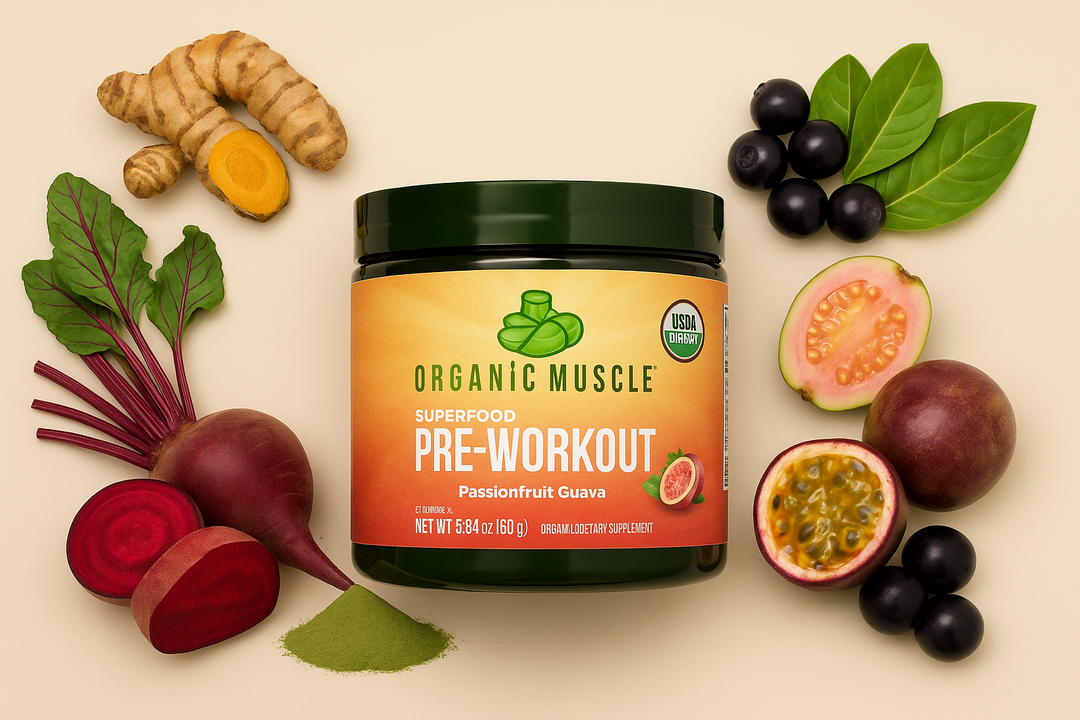Key Takeaways:
- Replenish Electrolytes for Optimal Recovery: Post-workout electrolyte replenishment is essential for hydration, muscle function, and nerve regulation. Key minerals like sodium, potassium, and magnesium lost through sweat must be restored to prevent fatigue, cramps, and dehydration.
- Natural Sources of Electrolytes: To replenish electrolytes naturally, incorporate foods like bananas, spinach, avocados, and coconut water into your post-workout routine. These foods provide vital minerals without the added sugars and chemicals that are found in some sports drinks.
- Choose Quality Electrolyte Supplements: Opt for organic, non-GMO electrolyte supplements free from artificial additives. Products like Organic Muscle supplements ensure clean, effective recovery support tailored to various dietary needs, including vegan and keto-friendly options.
At Organic Muscle, we're not just committed to fitness; we're pioneers in revolutionizing your workout experience with all-natural, organic supplements. Our reputation is built on delivering superior, eco-friendly products that not only meet but exceed the expectations of wellness enthusiasts everywhere. Organic Muscle is trusted by committed health and wellness enthusiasts who want trustworthy products that deliver results.
Exercise is a fantastic way to boost your health and well-being. But let's face it, pushing your limits can leave you feeling drained and depleted. That post-workout slump you experience isn't just fatigue; it could be a sign your body is low on electrolytes. These essential minerals are critical in muscle function, hydration, and nerve transmission. When electrolytes are lost through sweat, your performance can suffer, and your recovery time can slow down.
Understanding how to replenish electrolytes effectively after exercise can seem daunting. However, with the right knowledge and tools, it can be quite an enjoyable and refreshing part of your fitness routine!
In this article, we’ll discuss delicious and health-focused ways to recharge your body and sustain your workout gains. Whether you're a seasoned athlete or just starting your fitness journey, this guide will help you feel rejuvenated and ready to conquer your next challenge!
What Are Electrolytes And Why Replenish Them After Exercise?
Electrolytes are essential minerals in your blood, sweat, and urine that carry an electric charge. They include sodium, potassium, calcium, magnesium, and chloride. These key players can hel[ regulate nerve and muscle function, hydrate the body, balance blood acidity and pressure, and help rebuild damaged tissue. During a vigorous workout, your body loses these vital minerals through sweat. And this isn't just any sweat — this is the kind of perspiration that earns its salty reputation quite literally because electrolytes are salty!
Replenishing electrolytes after exercise is crucial to recovery and continued health. When you sweat, you lose water and electrolytes, which must be restored to maintain the balance necessary for normal body function.
Ignoring electrolyte replacement can lead to dehydration, muscle cramps, fatigue, and even more severe metabolic disturbances. Imagine trying to start a car without battery acid. It just won't work! In the same way, your body can't operate properly without these power-boosting minerals.
Importance Of Replenishing Electrolytes Post-Workout
After a vigorous workout, your body is depleted of energy and electrolytes — essential minerals that play crucial roles in your body. These include sodium, potassium, magnesium, calcium, and chloride. Sweating during exercise means you’re not just losing water, but also losing these vital nutrients as well.
Replenishing electrolytes post-workout is key for several reasons:
- Hydration: Electrolytes help regulate fluid balance by directing water to the areas in your body that need it most, aiding in proper hydration.
- Muscle Function: Electrolytes are essential for muscle contractions and help reduce cramping. Without adequate levels of electrolytes, muscles may become weak or cramp, which can be a big setback in your fitness progress.
- Nerve Function: Electrolytes carry electrical charges that stimulate nerves and regulate nerve function, essential for every movement and action your body makes.
- Acid-Base Balance: Electrolytes can help maintain the optimal pH level in your blood, which is crucial for your body’s overall functioning.
When you choose to replenish your electrolytes with products from Organic Muscle, you are supporting your post-workout recovery and ensuring that your body is replenished with high-quality, health-conscious ingredients.
Our supplements are designed for your total wellness, consistent with our commitment to purity and efficacy in every product we offer. Remember, after your workout, your body's immediate need isn't just for any electrolyte replenishment — it's for a source that is as committed to your health and fitness goals as you are.
Signs You Need To Replenish Electrolytes After Exercise
Recognizing when your body needs an electrolyte boost post-workout can be crucial for your recovery and overall health. Here are some key signs that indicate it's time to replenish your electrolytes:
- Increased Fatigue: If you're feeling more tired than usual after a workout, it could indicate that your electrolyte levels are depleted.
- Muscle Cramps: Electrolytes, like potassium and magnesium, play a vital role in muscle function. Experiencing cramps or spasms could signal that these crucial minerals are in short supply.
- Headaches: A post-workout headache can often be attributed to electrolyte imbalance, especially if you’re not adequately hydrated.
- Dizziness or Lightheadedness: These symptoms may occur if your electrolyte levels are off, affecting your blood pressure and circulation.
- Nausea: When your body lacks essential electrolytes, particularly sodium and potassium, you might feel nauseous post-exercise.
Observing these symptoms can help you manage your electrolytes and ensure that you are always at your optimum health and performance levels.
Best Sources Of Electrolytes For Post-Workout Recovery
Effective post-workout recovery hinges on replenishing lost electrolytes, which are essential for maintaining hydration, muscle function, and overall cellular health. Here are some of the best sources of electrolytes to ensure optimal recovery after a workout:
Organic Muscle Electrolyte Supplements
Designed with health and wellness in mind, our electrolyte supplements are free from unwanted additives and packed with organic, non-GMO, vegan-friendly ingredients, ensuring efficient and healthy recovery. The incredibly refreshing, thirst-quenching watermelon flavor delivers natural sweetness without synthetic ingredients or added sugars. Suitable for various dietary preferences, these supplements cater to vegans and those avoiding animal-derived ingredients, providing a clean, effective, and tasty way to support overall health post-workout.
Coconut Water
Nature’s hydrator, coconut water is a stellar pick for post-workout recovery. It’s low in calories and packed with potassium, making it one of the best natural ways to recharge your electrolyte levels. Plus, it adds a tasty tropical twist to your recovery routine!
Electrolyte-Infused Waters
When plain water doesn't cut it, electrolyte-infused waters can be a fantastic tool in your recovery arsenal. These enhanced waters often contain added electrolytes like potassium, magnesium, and sodium without the extra sugars that some sports drinks include.
DIY Electrolyte Drink
Mix up your recovery drink by adding a pinch of sea salt, which provides sodium, to a glass of water. Squeeze in some lemon or lime for a refreshing taste and a burst of vitamin C. If you need a touch of sweetness, consider a small amount of organic honey or agave.
Leafy Greens
Incorporating leafy greens like spinach and kale into your post-workout meal may also help replenish electrolytes. These veggies are high in magnesium and potassium and offer many other health benefits, including high fiber content and a slew of antioxidants.
Choosing any of these methods can significantly assist in restoring your body's balance. Remember, staying hydrated and maintaining electrolyte levels are crucial to optimizing your post-workout recovery and overall fitness results.
Foods That Help Replenish Electrolytes Naturally
Numerous natural food sources offer a readily available and effective means of replenishing electrolytes after exercise. Here's a breakdown of some key players:
- Bananas: Known for their high potassium content, bananas may help restore this vital mineral rapidly after exercise. Plus, they’re portable and easy to add to any post-workout smoothie.
- Spinach: This leafy green is a powerhouse of nutrients. It’s loaded with potassium, magnesium, and calcium — three of the primary electrolytes your body needs. Incorporate spinach into your post-workout meals for a nourishing electrolyte boost.
- Avocados: Avocados are another excellent source of potassium. They also provide healthy fats, which are essential for overall health and help in nutrient absorption. Whip up some guacamole or slice a few pieces to top off your salad.
- Sweet Potatoes: With impressive amounts of potassium and magnesium, sweet potatoes are ideal for restoring electrolyte levels. Serve them roasted or mashed as part of a hearty, beneficial post-workout meal.
- Watermelon: Besides being refreshing and hydrating, watermelon can offer a solid amount of potassium and magnesium. It’s perfect for a light snack after hitting the gym.
- Salted Nuts and Seeds: Some salted nuts or seeds may provide essential sodium, magnesium, and potassium. Choose almonds, cashews, or pumpkin seeds for a quick, electrolyte-replenishing treat.
Choosing The Right Electrolyte Supplements After Working Out
When replenishing your body post-workout, not all electrolyte supplements are created equal. The market is saturated with options, but choosing supplements that align with your values and health goals is crucial to maintaining a clean, health-conscious diet. Let’s explore some of the things to look out for when selecting an electrolyte supplement:
Ingredient Transparency
Seek out supplements that are open about what they contain. The best supplements list all their ingredients clearly, ensuring no hidden nasties. You want to avoid anything that includes artificial sweeteners, flavors, or preservatives.
Certified Organic And Non-GMO
Opt for supplements that are certified organic and non-GMO, such as our electrolyte supplement at Organic Muscle. These certifications ensure that the ingredients are safe and cultivated without harmful pesticides and genetically modified organisms. Organic certifications indicate strict production standards that are better for your body and the environment.
Allergen-Free Credentials
Make sure the electrolyte supplements you choose do not contain common allergens. Look for gluten-free, dairy-free, and soy-free labels to ensure they accommodate various dietary restrictions and preferences.
Keto-Friendly And Vegan
For those on specialized diets, such as keto or a plant-based regimen, it’s important that the electrolyte supplement supports your dietary needs. Keto-friendly products ensure low to zero carbs, aiding in maintaining ketosis, while vegan options guarantee they’re free of any animal-derived ingredients.
No Chemical Additives
A high-quality electrolyte supplement should be free from chemical additives like sucralose and other artificial sweeteners. Opt for supplements that are sweetened with natural alternatives or unsweetened altogether.
Tailoring Your Post-Workout Routine To Maintain Electrolyte Balance
Maintaining electrolyte balance after intense exercise can be crucial for optimal health and peak physical performance. Electrolytes, including potassium, sodium, and magnesium, are vital for many body processes. They can help regulate nerve function, hydration, blood pressure, and muscle contractions. Therefore, tailoring your post-workout routine to replenish these essential nutrients is imperative for sustained health and fitness.
Here are some tailored strategies to ensure effective replenishment of your electrolytes post-exercise:
Choose The Right Drinks
Instead of reaching for a sugary sports drink, opt for beverages with a high electrolyte content and lower sugar levels. Coconut water is a fantastic natural source that contains key electrolytes such as potassium and magnesium. Additionally, specially formulated electrolyte-infused waters or even electrolyte tablets dissolved in water can provide a quick, effective way to restore balance without the unnecessary additives in typical sports drinks.
Incorporate Electrolyte-Rich Foods
Your diet plays a significant role in your electrolyte levels. Include foods rich in electrolytes in your post-workout meal or snack. Bananas and avocados boast high potassium levels, while nuts and seeds provide magnesium and sodium. Creating a balanced meal with a combination of these foods can help restore your electrolyte levels naturally.
Consider Organic Supplements
Consider incorporating Organic Muscle's supplements into your routine for an effective and health-conscious way to top up your electrolytes. Our supplements are carefully crafted to ensure that you're not only replenishing what your body loses during a workout, but also doing so with the highest-quality ingredients, which are organic, non-GMO, and free from harmful chemicals and artificial additives.
Listen To Your Body
No one understands your body better than you. Pay attention to what your body needs after a workout. If you experience symptoms like prolonged fatigue, dizziness, or muscle cramps, these may be signs of electrolyte imbalance. Adjusting your hydration levels and electrolyte intake according to your feelings can be a practical approach to tailoring your post-workout routine.
Implementing these tailored strategies into your post-workout regimen can enhance your recovery and boost your overall health and fitness outcomes. Remember, the key is in the balance of your electrolytes and your approach to wellness.
Final Thoughts
In wrapping up our refreshing journey through the world of electrolyte replenishment post-workout, remember that maintaining a balanced electrolyte level is paramount for rehydrating and re-energizing your body effectively. Post-exercise recovery isn't just about gulping down water; it’s about embracing a holistic approach to wellness, ensuring your hydration method replenishes essential nutrients lost in sweat.
So, whether you opt for natural food sources or prefer the convenience of our meticulously crafted supplements, maintaining your electrolyte balance post-workout can be satisfying and align with your overall health and wellness goals. With each sip or bite, you're taking a step toward optimal health, ensuring every workout concludes as a triumph for your body’s recovery and resilience.
Stay hydrated, stay healthy, and keep pushing the limits with confidence!
Read also:
- Recharge Naturally: Unveiling The Secrets Of Natural Electrolytes
- Best Supplements For Muscle Growth
- Best Supplements For Athletes: Maximize Your Workouts
Frequently Asked Questions About How To Replenish Electrolytes
How do electrolyte tablets or powders work?
Electrolyte tablets or powders dissolve in water to provide vital minerals such as sodium, potassium, calcium, and magnesium. These minerals help regulate nerve and muscle function, hydrate the body, balance blood acidity and pressure, and help rebuild damaged tissue.
Are there risks of consuming too many electrolytes?
Yes, consuming too many electrolytes can lead to an imbalance known as hypernatremia or hyperkalemia, among others, which can be harmful. Symptoms include nausea, vomiting, confusion, and in severe cases, seizures or heart arrhythmias. It's important to adhere to recommended dosages.
Can you overhydrate when replenishing electrolytes?
Yes, overhydration or water intoxication happens when you drink too much water without adequate electrolytes, diluting your body's sodium levels. Balancing water intake with electrolyte levels is crucial, particularly during extended physical activity.
What are the benefits of homemade electrolyte drinks?
Homemade electrolyte drinks can be a natural and cost-effective way to replenish lost minerals. They can be made with natural ingredients such as lemon juice, coconut water, sea salt, and natural sweeteners, avoiding artificial colors and flavors.
Should I consume electrolytes before or after a workout?
Consuming electrolytes before and after workouts is beneficial for maintaining hydration levels, preventing muscle cramps, and facilitating recovery. Electrolytes help maintain fluid balance before workouts — and after workouts, they can aid in quick recovery.
Do electrolyte needs vary based on the type of workout?
Yes, electrolyte needs can vary depending on the intensity and duration of the workout. Longer and more strenuous workouts typically require more electrolytes to compensate for increased fluid loss through sweat.
Is it necessary to replenish electrolytes if I'm not sweating heavily?
Even if you're not sweating heavily, electrolytes play vital roles in many bodily functions. Moderate replenishment is still beneficial, particularly after long-duration light exercises or in hot weather.
Are electrolyte drinks suitable for everyday hydration?
While electrolyte drinks can support hydration, they're generally not necessary for everyday use unless you're participating in prolonged physical activity or are in hot climates. Regular water is usually sufficient for typical daily activities.
Do electrolyte needs differ between men and women?
Electrolyte needs may vary slightly based on differences in body composition, sweat rate, and hormonal fluctuations. However, the fundamental requirements for electrolytes are generally similar, and individual needs can be adjusted based on personal sweat rates and workout intensity.
Can I get electrolytes from supplements alone?
While it's possible to obtain electrolytes from supplements alone, it's also important to have a balanced diet rich in electrolytes from natural sources like fruits, vegetables, nuts, and seeds for overall nutritional balance and health.
Sources:
- Lau, W. Y., Kato, H., & Nosaka, K. (2019). Water intake after dehydration makes muscles more susceptible to cramp but electrolytes reverse that effect. BMJ Open Sport & Exercise Medicine, 5(1), e000478. https://doi.org/10.1136/bmjsem-2018-000478
- Vera, M. (2023, February 19). Hypernatremia & Hyponatremia (Sodium Imbalances) Nursing Care Plans. Nurseslabs. https://nurseslabs.com/hypernatremia-hyponatremia-sodium-imbalances-nursing-care-plans/














